Coca-Cola's Marketing Management: Strategy & Market Orientation
VerifiedAdded on 2023/06/14
|9
|2535
|291
Case Study
AI Summary
This case study explores Coca-Cola's marketing strategies, focusing on the concept and role of marketing in achieving organizational objectives, particularly in the Nigerian market. It discusses how Coca-Cola fulfills demand and supply, increases brand awareness, creates utility, and delivers perceived value through functional, monetary, social, and psychological approaches. The report also examines Coca-Cola's market orientation, including its focus on market trends, customer retention, tactical decision-making, and new product development. The analysis highlights how these elements contribute to the company's success and ability to survive challenging market conditions, ultimately increasing productivity and delivering value to customers.
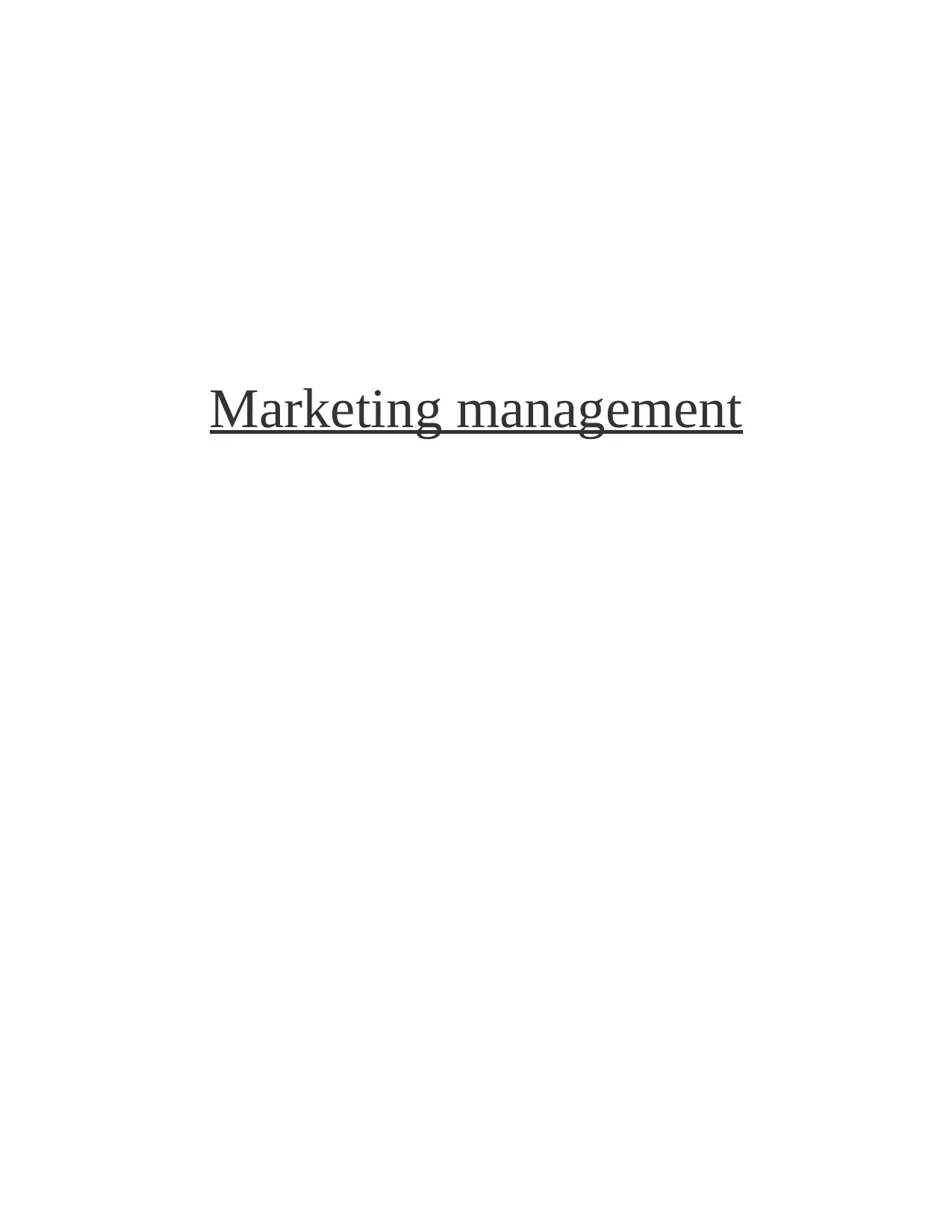
Marketing management
Paraphrase This Document
Need a fresh take? Get an instant paraphrase of this document with our AI Paraphraser
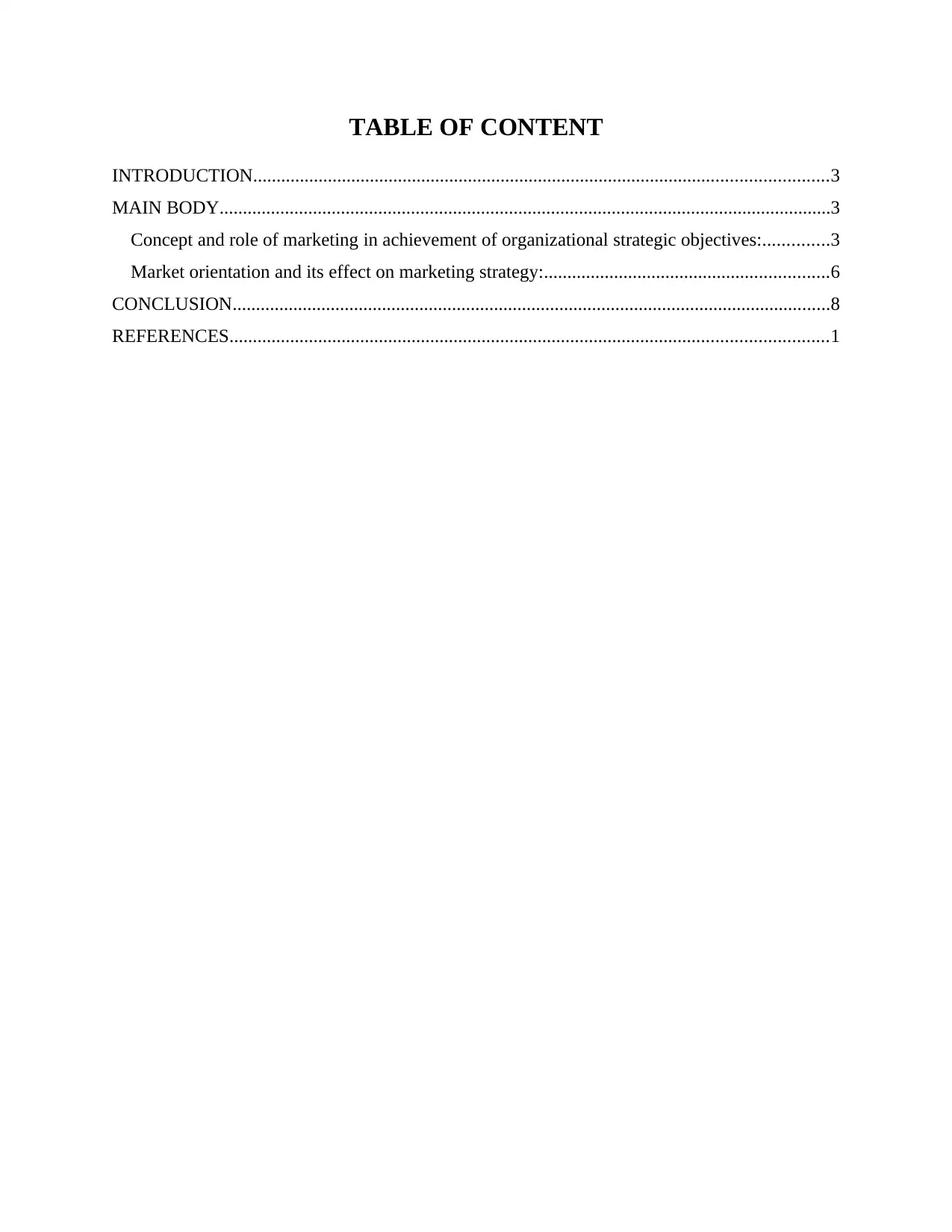
TABLE OF CONTENT
INTRODUCTION...........................................................................................................................3
MAIN BODY...................................................................................................................................3
Concept and role of marketing in achievement of organizational strategic objectives:..............3
Market orientation and its effect on marketing strategy:.............................................................6
CONCLUSION................................................................................................................................8
REFERENCES................................................................................................................................1
INTRODUCTION...........................................................................................................................3
MAIN BODY...................................................................................................................................3
Concept and role of marketing in achievement of organizational strategic objectives:..............3
Market orientation and its effect on marketing strategy:.............................................................6
CONCLUSION................................................................................................................................8
REFERENCES................................................................................................................................1
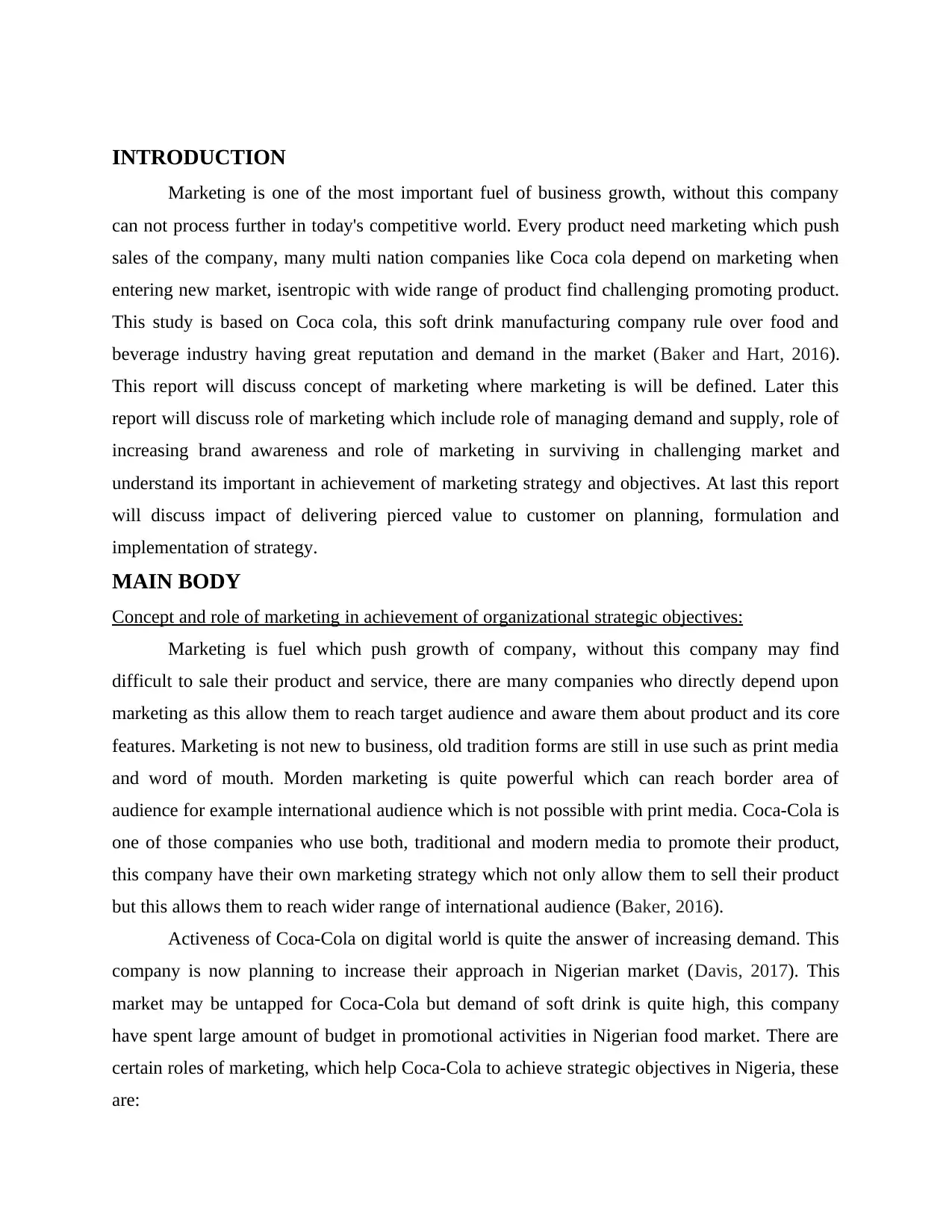
INTRODUCTION
Marketing is one of the most important fuel of business growth, without this company
can not process further in today's competitive world. Every product need marketing which push
sales of the company, many multi nation companies like Coca cola depend on marketing when
entering new market, isentropic with wide range of product find challenging promoting product.
This study is based on Coca cola, this soft drink manufacturing company rule over food and
beverage industry having great reputation and demand in the market (Baker and Hart, 2016).
This report will discuss concept of marketing where marketing is will be defined. Later this
report will discuss role of marketing which include role of managing demand and supply, role of
increasing brand awareness and role of marketing in surviving in challenging market and
understand its important in achievement of marketing strategy and objectives. At last this report
will discuss impact of delivering pierced value to customer on planning, formulation and
implementation of strategy.
MAIN BODY
Concept and role of marketing in achievement of organizational strategic objectives:
Marketing is fuel which push growth of company, without this company may find
difficult to sale their product and service, there are many companies who directly depend upon
marketing as this allow them to reach target audience and aware them about product and its core
features. Marketing is not new to business, old tradition forms are still in use such as print media
and word of mouth. Morden marketing is quite powerful which can reach border area of
audience for example international audience which is not possible with print media. Coca-Cola is
one of those companies who use both, traditional and modern media to promote their product,
this company have their own marketing strategy which not only allow them to sell their product
but this allows them to reach wider range of international audience (Baker, 2016).
Activeness of Coca-Cola on digital world is quite the answer of increasing demand. This
company is now planning to increase their approach in Nigerian market (Davis, 2017). This
market may be untapped for Coca-Cola but demand of soft drink is quite high, this company
have spent large amount of budget in promotional activities in Nigerian food market. There are
certain roles of marketing, which help Coca-Cola to achieve strategic objectives in Nigeria, these
are:
Marketing is one of the most important fuel of business growth, without this company
can not process further in today's competitive world. Every product need marketing which push
sales of the company, many multi nation companies like Coca cola depend on marketing when
entering new market, isentropic with wide range of product find challenging promoting product.
This study is based on Coca cola, this soft drink manufacturing company rule over food and
beverage industry having great reputation and demand in the market (Baker and Hart, 2016).
This report will discuss concept of marketing where marketing is will be defined. Later this
report will discuss role of marketing which include role of managing demand and supply, role of
increasing brand awareness and role of marketing in surviving in challenging market and
understand its important in achievement of marketing strategy and objectives. At last this report
will discuss impact of delivering pierced value to customer on planning, formulation and
implementation of strategy.
MAIN BODY
Concept and role of marketing in achievement of organizational strategic objectives:
Marketing is fuel which push growth of company, without this company may find
difficult to sale their product and service, there are many companies who directly depend upon
marketing as this allow them to reach target audience and aware them about product and its core
features. Marketing is not new to business, old tradition forms are still in use such as print media
and word of mouth. Morden marketing is quite powerful which can reach border area of
audience for example international audience which is not possible with print media. Coca-Cola is
one of those companies who use both, traditional and modern media to promote their product,
this company have their own marketing strategy which not only allow them to sell their product
but this allows them to reach wider range of international audience (Baker, 2016).
Activeness of Coca-Cola on digital world is quite the answer of increasing demand. This
company is now planning to increase their approach in Nigerian market (Davis, 2017). This
market may be untapped for Coca-Cola but demand of soft drink is quite high, this company
have spent large amount of budget in promotional activities in Nigerian food market. There are
certain roles of marketing, which help Coca-Cola to achieve strategic objectives in Nigeria, these
are:
⊘ This is a preview!⊘
Do you want full access?
Subscribe today to unlock all pages.

Trusted by 1+ million students worldwide
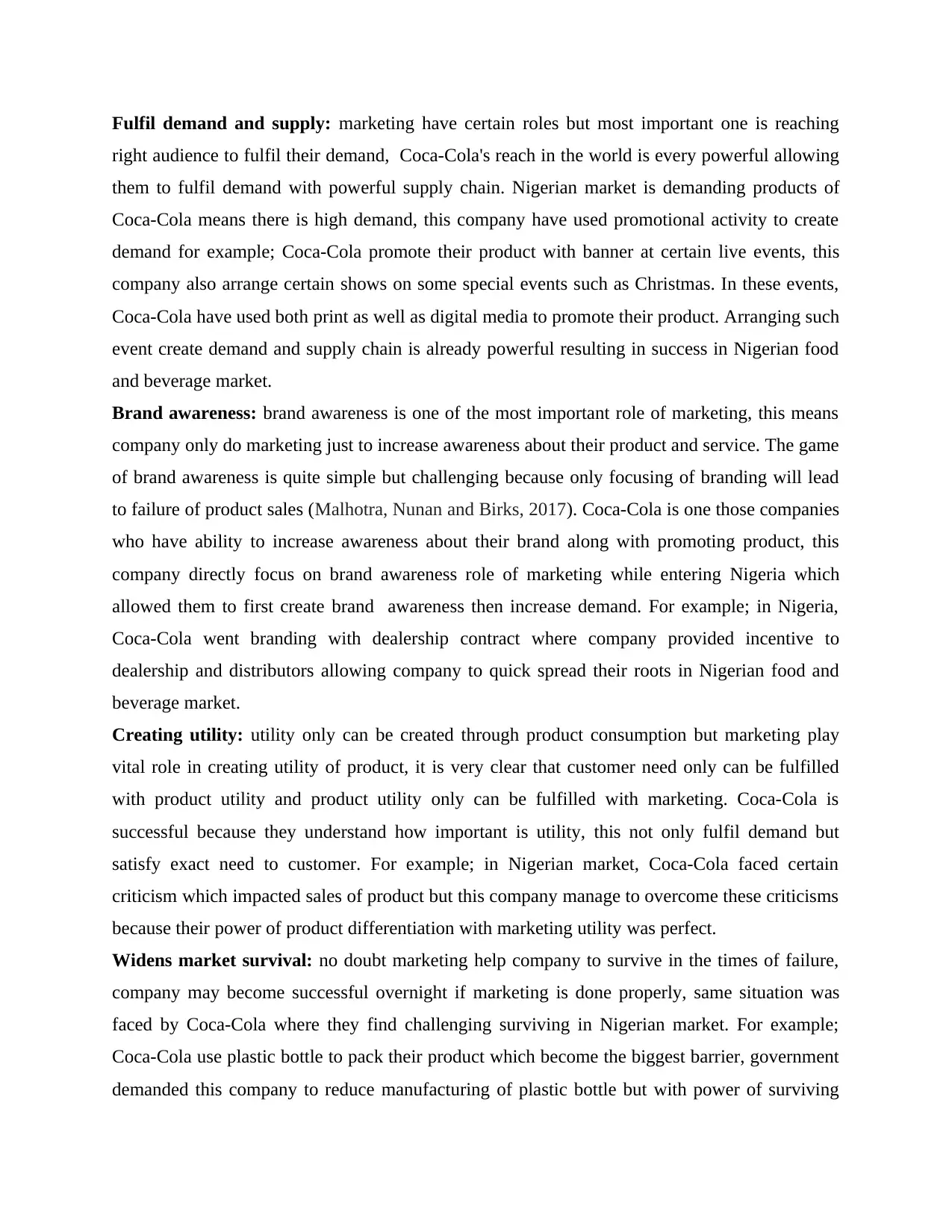
Fulfil demand and supply: marketing have certain roles but most important one is reaching
right audience to fulfil their demand, Coca-Cola's reach in the world is every powerful allowing
them to fulfil demand with powerful supply chain. Nigerian market is demanding products of
Coca-Cola means there is high demand, this company have used promotional activity to create
demand for example; Coca-Cola promote their product with banner at certain live events, this
company also arrange certain shows on some special events such as Christmas. In these events,
Coca-Cola have used both print as well as digital media to promote their product. Arranging such
event create demand and supply chain is already powerful resulting in success in Nigerian food
and beverage market.
Brand awareness: brand awareness is one of the most important role of marketing, this means
company only do marketing just to increase awareness about their product and service. The game
of brand awareness is quite simple but challenging because only focusing of branding will lead
to failure of product sales (Malhotra, Nunan and Birks, 2017). Coca-Cola is one those companies
who have ability to increase awareness about their brand along with promoting product, this
company directly focus on brand awareness role of marketing while entering Nigeria which
allowed them to first create brand awareness then increase demand. For example; in Nigeria,
Coca-Cola went branding with dealership contract where company provided incentive to
dealership and distributors allowing company to quick spread their roots in Nigerian food and
beverage market.
Creating utility: utility only can be created through product consumption but marketing play
vital role in creating utility of product, it is very clear that customer need only can be fulfilled
with product utility and product utility only can be fulfilled with marketing. Coca-Cola is
successful because they understand how important is utility, this not only fulfil demand but
satisfy exact need to customer. For example; in Nigerian market, Coca-Cola faced certain
criticism which impacted sales of product but this company manage to overcome these criticisms
because their power of product differentiation with marketing utility was perfect.
Widens market survival: no doubt marketing help company to survive in the times of failure,
company may become successful overnight if marketing is done properly, same situation was
faced by Coca-Cola where they find challenging surviving in Nigerian market. For example;
Coca-Cola use plastic bottle to pack their product which become the biggest barrier, government
demanded this company to reduce manufacturing of plastic bottle but with power of surviving
right audience to fulfil their demand, Coca-Cola's reach in the world is every powerful allowing
them to fulfil demand with powerful supply chain. Nigerian market is demanding products of
Coca-Cola means there is high demand, this company have used promotional activity to create
demand for example; Coca-Cola promote their product with banner at certain live events, this
company also arrange certain shows on some special events such as Christmas. In these events,
Coca-Cola have used both print as well as digital media to promote their product. Arranging such
event create demand and supply chain is already powerful resulting in success in Nigerian food
and beverage market.
Brand awareness: brand awareness is one of the most important role of marketing, this means
company only do marketing just to increase awareness about their product and service. The game
of brand awareness is quite simple but challenging because only focusing of branding will lead
to failure of product sales (Malhotra, Nunan and Birks, 2017). Coca-Cola is one those companies
who have ability to increase awareness about their brand along with promoting product, this
company directly focus on brand awareness role of marketing while entering Nigeria which
allowed them to first create brand awareness then increase demand. For example; in Nigeria,
Coca-Cola went branding with dealership contract where company provided incentive to
dealership and distributors allowing company to quick spread their roots in Nigerian food and
beverage market.
Creating utility: utility only can be created through product consumption but marketing play
vital role in creating utility of product, it is very clear that customer need only can be fulfilled
with product utility and product utility only can be fulfilled with marketing. Coca-Cola is
successful because they understand how important is utility, this not only fulfil demand but
satisfy exact need to customer. For example; in Nigerian market, Coca-Cola faced certain
criticism which impacted sales of product but this company manage to overcome these criticisms
because their power of product differentiation with marketing utility was perfect.
Widens market survival: no doubt marketing help company to survive in the times of failure,
company may become successful overnight if marketing is done properly, same situation was
faced by Coca-Cola where they find challenging surviving in Nigerian market. For example;
Coca-Cola use plastic bottle to pack their product which become the biggest barrier, government
demanded this company to reduce manufacturing of plastic bottle but with power of surviving
Paraphrase This Document
Need a fresh take? Get an instant paraphrase of this document with our AI Paraphraser
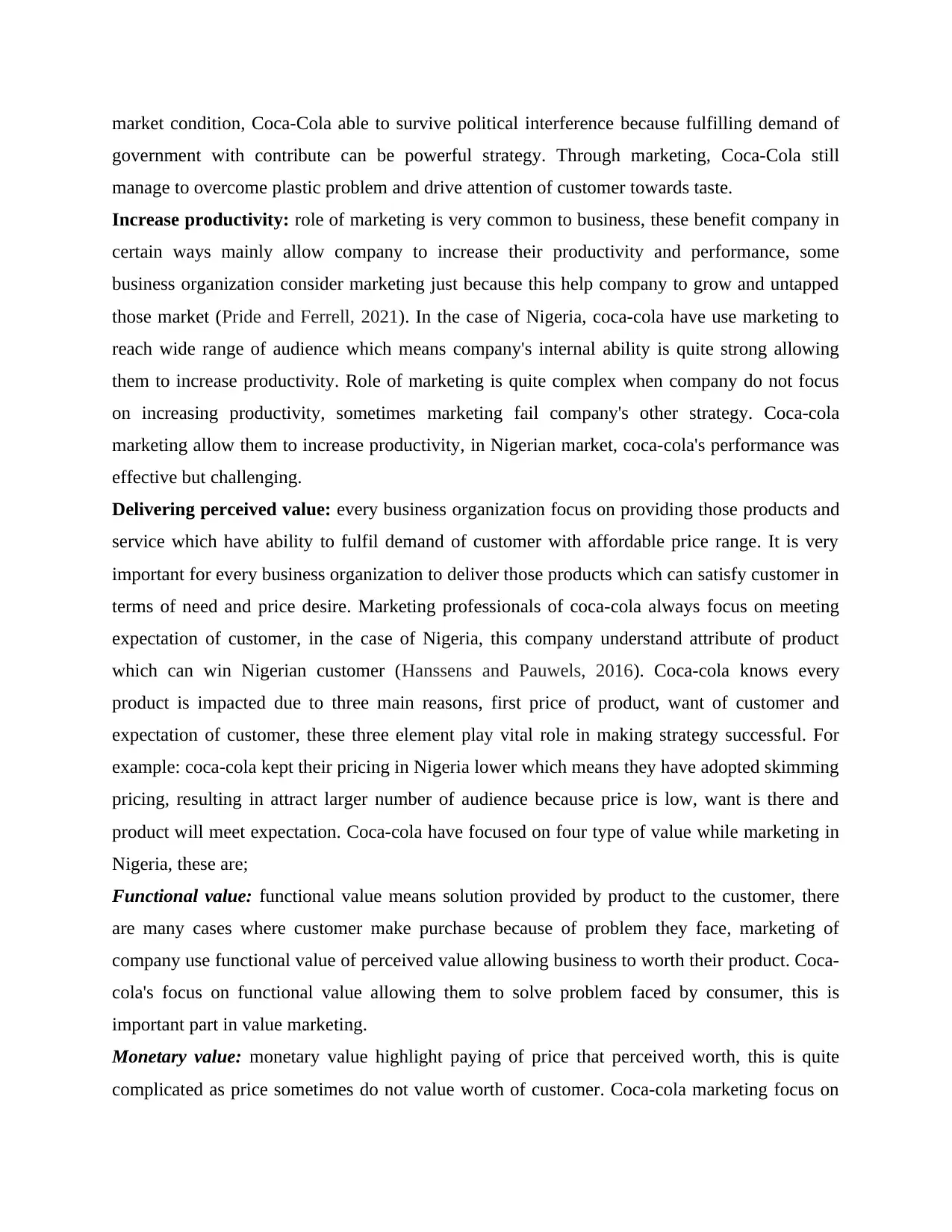
market condition, Coca-Cola able to survive political interference because fulfilling demand of
government with contribute can be powerful strategy. Through marketing, Coca-Cola still
manage to overcome plastic problem and drive attention of customer towards taste.
Increase productivity: role of marketing is very common to business, these benefit company in
certain ways mainly allow company to increase their productivity and performance, some
business organization consider marketing just because this help company to grow and untapped
those market (Pride and Ferrell, 2021). In the case of Nigeria, coca-cola have use marketing to
reach wide range of audience which means company's internal ability is quite strong allowing
them to increase productivity. Role of marketing is quite complex when company do not focus
on increasing productivity, sometimes marketing fail company's other strategy. Coca-cola
marketing allow them to increase productivity, in Nigerian market, coca-cola's performance was
effective but challenging.
Delivering perceived value: every business organization focus on providing those products and
service which have ability to fulfil demand of customer with affordable price range. It is very
important for every business organization to deliver those products which can satisfy customer in
terms of need and price desire. Marketing professionals of coca-cola always focus on meeting
expectation of customer, in the case of Nigeria, this company understand attribute of product
which can win Nigerian customer (Hanssens and Pauwels, 2016). Coca-cola knows every
product is impacted due to three main reasons, first price of product, want of customer and
expectation of customer, these three element play vital role in making strategy successful. For
example: coca-cola kept their pricing in Nigeria lower which means they have adopted skimming
pricing, resulting in attract larger number of audience because price is low, want is there and
product will meet expectation. Coca-cola have focused on four type of value while marketing in
Nigeria, these are;
Functional value: functional value means solution provided by product to the customer, there
are many cases where customer make purchase because of problem they face, marketing of
company use functional value of perceived value allowing business to worth their product. Coca-
cola's focus on functional value allowing them to solve problem faced by consumer, this is
important part in value marketing.
Monetary value: monetary value highlight paying of price that perceived worth, this is quite
complicated as price sometimes do not value worth of customer. Coca-cola marketing focus on
government with contribute can be powerful strategy. Through marketing, Coca-Cola still
manage to overcome plastic problem and drive attention of customer towards taste.
Increase productivity: role of marketing is very common to business, these benefit company in
certain ways mainly allow company to increase their productivity and performance, some
business organization consider marketing just because this help company to grow and untapped
those market (Pride and Ferrell, 2021). In the case of Nigeria, coca-cola have use marketing to
reach wide range of audience which means company's internal ability is quite strong allowing
them to increase productivity. Role of marketing is quite complex when company do not focus
on increasing productivity, sometimes marketing fail company's other strategy. Coca-cola
marketing allow them to increase productivity, in Nigerian market, coca-cola's performance was
effective but challenging.
Delivering perceived value: every business organization focus on providing those products and
service which have ability to fulfil demand of customer with affordable price range. It is very
important for every business organization to deliver those products which can satisfy customer in
terms of need and price desire. Marketing professionals of coca-cola always focus on meeting
expectation of customer, in the case of Nigeria, this company understand attribute of product
which can win Nigerian customer (Hanssens and Pauwels, 2016). Coca-cola knows every
product is impacted due to three main reasons, first price of product, want of customer and
expectation of customer, these three element play vital role in making strategy successful. For
example: coca-cola kept their pricing in Nigeria lower which means they have adopted skimming
pricing, resulting in attract larger number of audience because price is low, want is there and
product will meet expectation. Coca-cola have focused on four type of value while marketing in
Nigeria, these are;
Functional value: functional value means solution provided by product to the customer, there
are many cases where customer make purchase because of problem they face, marketing of
company use functional value of perceived value allowing business to worth their product. Coca-
cola's focus on functional value allowing them to solve problem faced by consumer, this is
important part in value marketing.
Monetary value: monetary value highlight paying of price that perceived worth, this is quite
complicated as price sometimes do not value worth of customer. Coca-cola marketing focus on
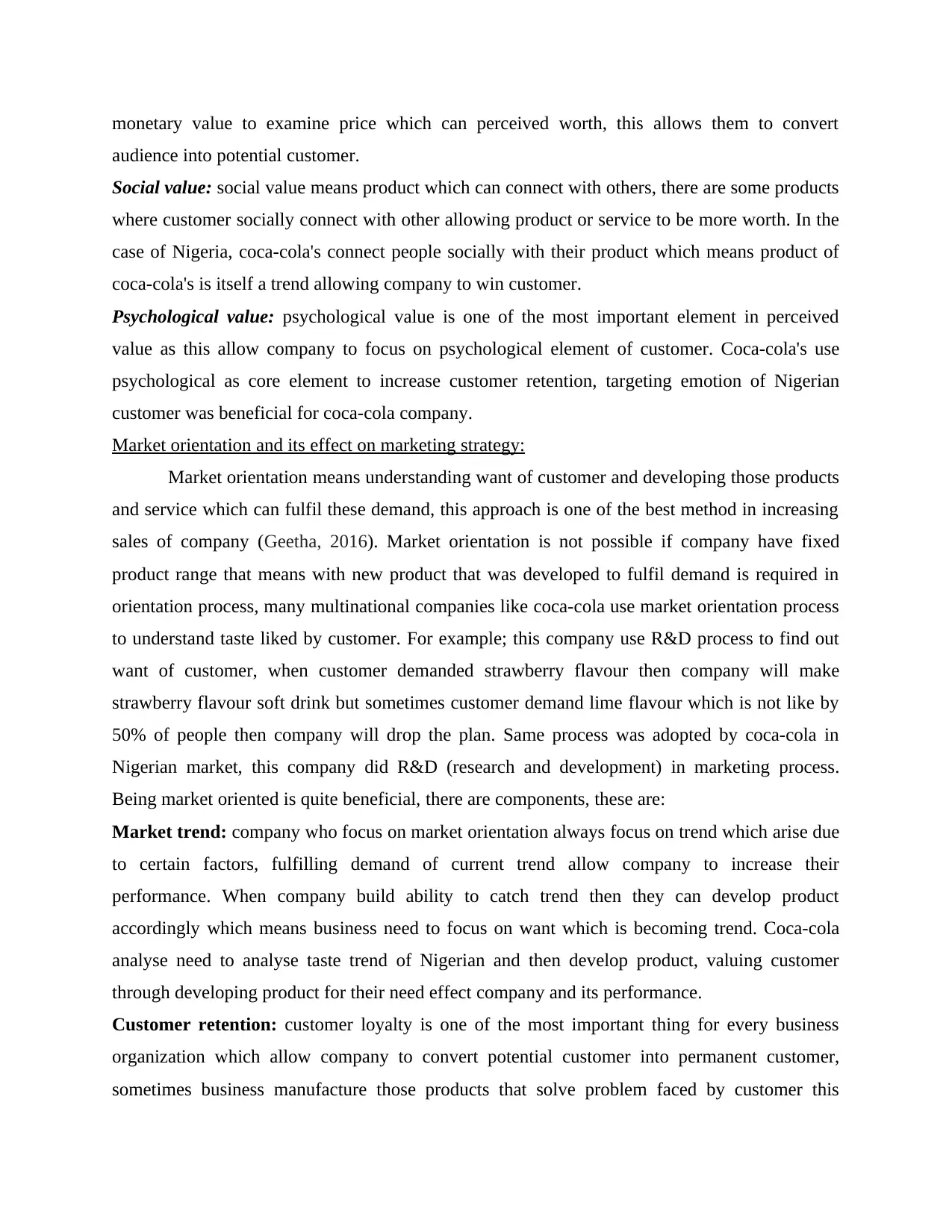
monetary value to examine price which can perceived worth, this allows them to convert
audience into potential customer.
Social value: social value means product which can connect with others, there are some products
where customer socially connect with other allowing product or service to be more worth. In the
case of Nigeria, coca-cola's connect people socially with their product which means product of
coca-cola's is itself a trend allowing company to win customer.
Psychological value: psychological value is one of the most important element in perceived
value as this allow company to focus on psychological element of customer. Coca-cola's use
psychological as core element to increase customer retention, targeting emotion of Nigerian
customer was beneficial for coca-cola company.
Market orientation and its effect on marketing strategy:
Market orientation means understanding want of customer and developing those products
and service which can fulfil these demand, this approach is one of the best method in increasing
sales of company (Geetha, 2016). Market orientation is not possible if company have fixed
product range that means with new product that was developed to fulfil demand is required in
orientation process, many multinational companies like coca-cola use market orientation process
to understand taste liked by customer. For example; this company use R&D process to find out
want of customer, when customer demanded strawberry flavour then company will make
strawberry flavour soft drink but sometimes customer demand lime flavour which is not like by
50% of people then company will drop the plan. Same process was adopted by coca-cola in
Nigerian market, this company did R&D (research and development) in marketing process.
Being market oriented is quite beneficial, there are components, these are:
Market trend: company who focus on market orientation always focus on trend which arise due
to certain factors, fulfilling demand of current trend allow company to increase their
performance. When company build ability to catch trend then they can develop product
accordingly which means business need to focus on want which is becoming trend. Coca-cola
analyse need to analyse taste trend of Nigerian and then develop product, valuing customer
through developing product for their need effect company and its performance.
Customer retention: customer loyalty is one of the most important thing for every business
organization which allow company to convert potential customer into permanent customer,
sometimes business manufacture those products that solve problem faced by customer this
audience into potential customer.
Social value: social value means product which can connect with others, there are some products
where customer socially connect with other allowing product or service to be more worth. In the
case of Nigeria, coca-cola's connect people socially with their product which means product of
coca-cola's is itself a trend allowing company to win customer.
Psychological value: psychological value is one of the most important element in perceived
value as this allow company to focus on psychological element of customer. Coca-cola's use
psychological as core element to increase customer retention, targeting emotion of Nigerian
customer was beneficial for coca-cola company.
Market orientation and its effect on marketing strategy:
Market orientation means understanding want of customer and developing those products
and service which can fulfil these demand, this approach is one of the best method in increasing
sales of company (Geetha, 2016). Market orientation is not possible if company have fixed
product range that means with new product that was developed to fulfil demand is required in
orientation process, many multinational companies like coca-cola use market orientation process
to understand taste liked by customer. For example; this company use R&D process to find out
want of customer, when customer demanded strawberry flavour then company will make
strawberry flavour soft drink but sometimes customer demand lime flavour which is not like by
50% of people then company will drop the plan. Same process was adopted by coca-cola in
Nigerian market, this company did R&D (research and development) in marketing process.
Being market oriented is quite beneficial, there are components, these are:
Market trend: company who focus on market orientation always focus on trend which arise due
to certain factors, fulfilling demand of current trend allow company to increase their
performance. When company build ability to catch trend then they can develop product
accordingly which means business need to focus on want which is becoming trend. Coca-cola
analyse need to analyse taste trend of Nigerian and then develop product, valuing customer
through developing product for their need effect company and its performance.
Customer retention: customer loyalty is one of the most important thing for every business
organization which allow company to convert potential customer into permanent customer,
sometimes business manufacture those products that solve problem faced by customer this
⊘ This is a preview!⊘
Do you want full access?
Subscribe today to unlock all pages.

Trusted by 1+ million students worldwide
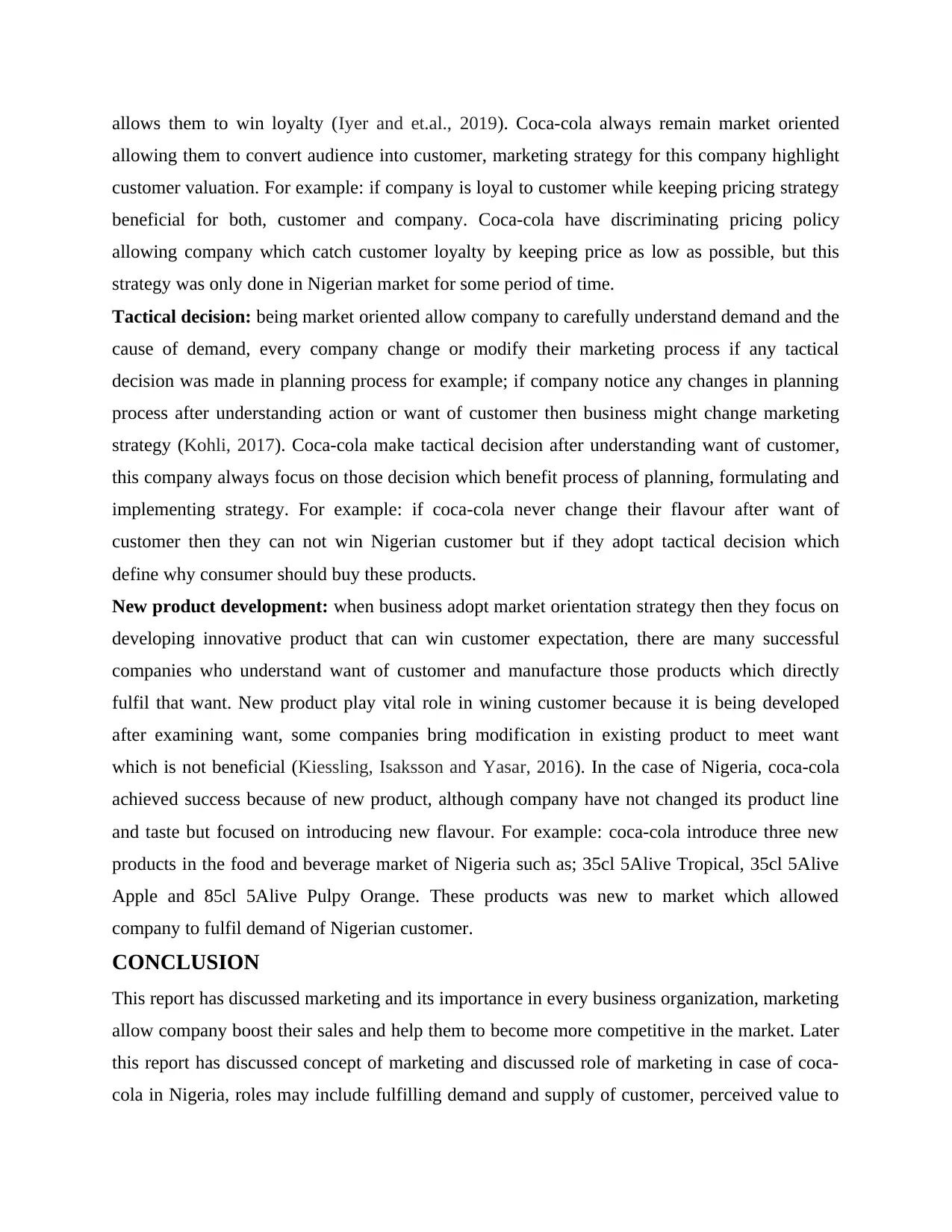
allows them to win loyalty (Iyer and et.al., 2019). Coca-cola always remain market oriented
allowing them to convert audience into customer, marketing strategy for this company highlight
customer valuation. For example: if company is loyal to customer while keeping pricing strategy
beneficial for both, customer and company. Coca-cola have discriminating pricing policy
allowing company which catch customer loyalty by keeping price as low as possible, but this
strategy was only done in Nigerian market for some period of time.
Tactical decision: being market oriented allow company to carefully understand demand and the
cause of demand, every company change or modify their marketing process if any tactical
decision was made in planning process for example; if company notice any changes in planning
process after understanding action or want of customer then business might change marketing
strategy (Kohli, 2017). Coca-cola make tactical decision after understanding want of customer,
this company always focus on those decision which benefit process of planning, formulating and
implementing strategy. For example: if coca-cola never change their flavour after want of
customer then they can not win Nigerian customer but if they adopt tactical decision which
define why consumer should buy these products.
New product development: when business adopt market orientation strategy then they focus on
developing innovative product that can win customer expectation, there are many successful
companies who understand want of customer and manufacture those products which directly
fulfil that want. New product play vital role in wining customer because it is being developed
after examining want, some companies bring modification in existing product to meet want
which is not beneficial (Kiessling, Isaksson and Yasar, 2016). In the case of Nigeria, coca-cola
achieved success because of new product, although company have not changed its product line
and taste but focused on introducing new flavour. For example: coca-cola introduce three new
products in the food and beverage market of Nigeria such as; 35cl 5Alive Tropical, 35cl 5Alive
Apple and 85cl 5Alive Pulpy Orange. These products was new to market which allowed
company to fulfil demand of Nigerian customer.
CONCLUSION
This report has discussed marketing and its importance in every business organization, marketing
allow company boost their sales and help them to become more competitive in the market. Later
this report has discussed concept of marketing and discussed role of marketing in case of coca-
cola in Nigeria, roles may include fulfilling demand and supply of customer, perceived value to
allowing them to convert audience into customer, marketing strategy for this company highlight
customer valuation. For example: if company is loyal to customer while keeping pricing strategy
beneficial for both, customer and company. Coca-cola have discriminating pricing policy
allowing company which catch customer loyalty by keeping price as low as possible, but this
strategy was only done in Nigerian market for some period of time.
Tactical decision: being market oriented allow company to carefully understand demand and the
cause of demand, every company change or modify their marketing process if any tactical
decision was made in planning process for example; if company notice any changes in planning
process after understanding action or want of customer then business might change marketing
strategy (Kohli, 2017). Coca-cola make tactical decision after understanding want of customer,
this company always focus on those decision which benefit process of planning, formulating and
implementing strategy. For example: if coca-cola never change their flavour after want of
customer then they can not win Nigerian customer but if they adopt tactical decision which
define why consumer should buy these products.
New product development: when business adopt market orientation strategy then they focus on
developing innovative product that can win customer expectation, there are many successful
companies who understand want of customer and manufacture those products which directly
fulfil that want. New product play vital role in wining customer because it is being developed
after examining want, some companies bring modification in existing product to meet want
which is not beneficial (Kiessling, Isaksson and Yasar, 2016). In the case of Nigeria, coca-cola
achieved success because of new product, although company have not changed its product line
and taste but focused on introducing new flavour. For example: coca-cola introduce three new
products in the food and beverage market of Nigeria such as; 35cl 5Alive Tropical, 35cl 5Alive
Apple and 85cl 5Alive Pulpy Orange. These products was new to market which allowed
company to fulfil demand of Nigerian customer.
CONCLUSION
This report has discussed marketing and its importance in every business organization, marketing
allow company boost their sales and help them to become more competitive in the market. Later
this report has discussed concept of marketing and discussed role of marketing in case of coca-
cola in Nigeria, roles may include fulfilling demand and supply of customer, perceived value to
Paraphrase This Document
Need a fresh take? Get an instant paraphrase of this document with our AI Paraphraser
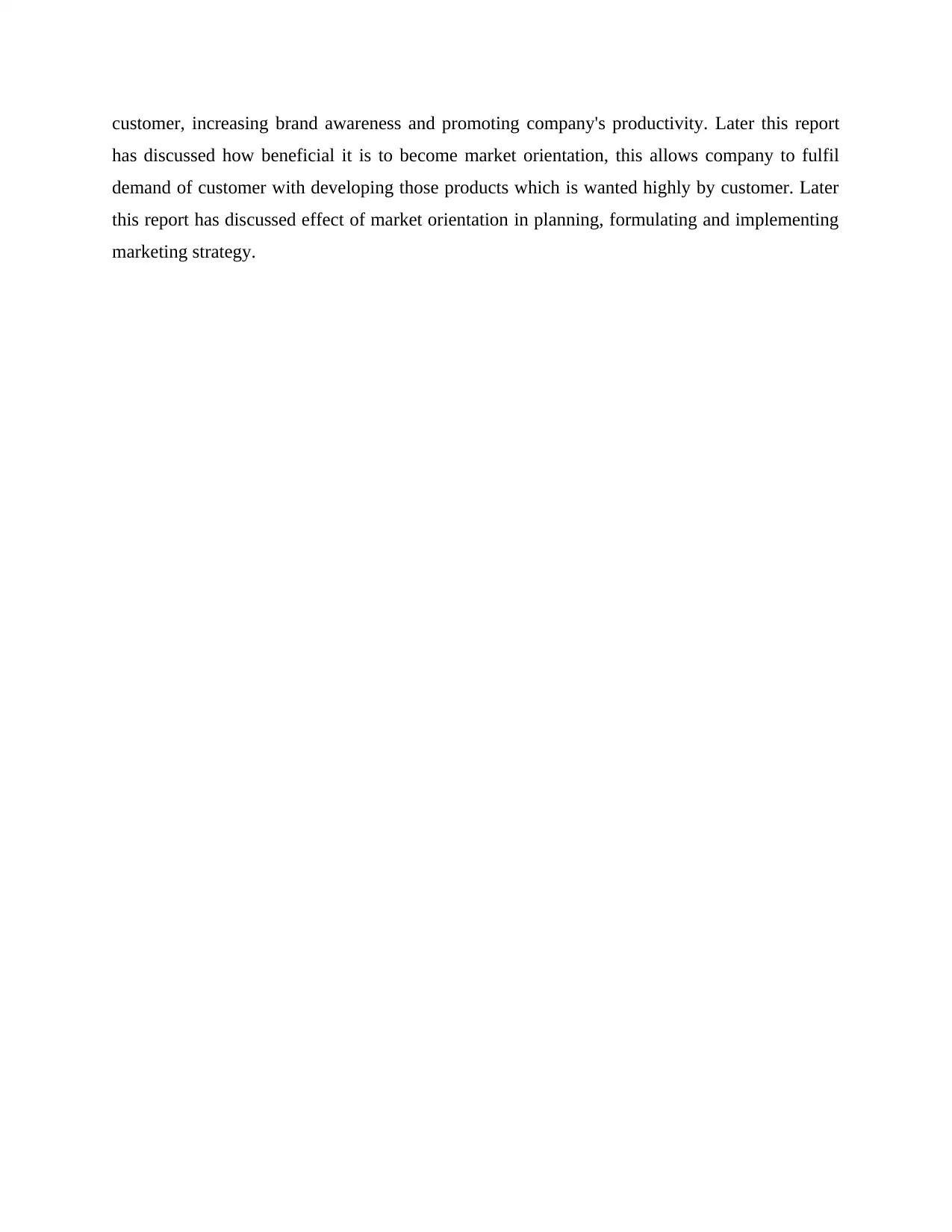
customer, increasing brand awareness and promoting company's productivity. Later this report
has discussed how beneficial it is to become market orientation, this allows company to fulfil
demand of customer with developing those products which is wanted highly by customer. Later
this report has discussed effect of market orientation in planning, formulating and implementing
marketing strategy.
has discussed how beneficial it is to become market orientation, this allows company to fulfil
demand of customer with developing those products which is wanted highly by customer. Later
this report has discussed effect of market orientation in planning, formulating and implementing
marketing strategy.
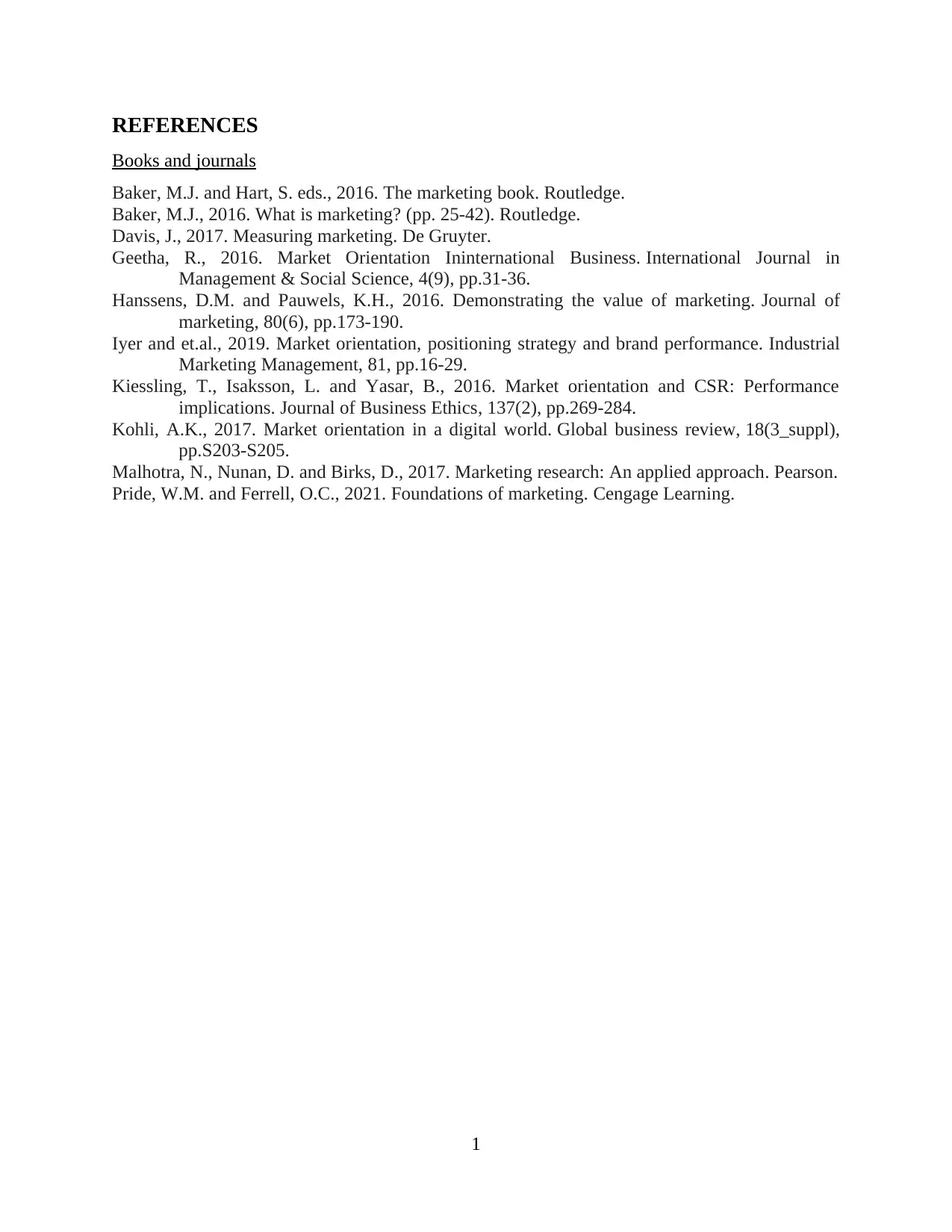
REFERENCES
Books and journals
Baker, M.J. and Hart, S. eds., 2016. The marketing book. Routledge.
Baker, M.J., 2016. What is marketing? (pp. 25-42). Routledge.
Davis, J., 2017. Measuring marketing. De Gruyter.
Geetha, R., 2016. Market Orientation Ininternational Business. International Journal in
Management & Social Science, 4(9), pp.31-36.
Hanssens, D.M. and Pauwels, K.H., 2016. Demonstrating the value of marketing. Journal of
marketing, 80(6), pp.173-190.
Iyer and et.al., 2019. Market orientation, positioning strategy and brand performance. Industrial
Marketing Management, 81, pp.16-29.
Kiessling, T., Isaksson, L. and Yasar, B., 2016. Market orientation and CSR: Performance
implications. Journal of Business Ethics, 137(2), pp.269-284.
Kohli, A.K., 2017. Market orientation in a digital world. Global business review, 18(3_suppl),
pp.S203-S205.
Malhotra, N., Nunan, D. and Birks, D., 2017. Marketing research: An applied approach. Pearson.
Pride, W.M. and Ferrell, O.C., 2021. Foundations of marketing. Cengage Learning.
1
Books and journals
Baker, M.J. and Hart, S. eds., 2016. The marketing book. Routledge.
Baker, M.J., 2016. What is marketing? (pp. 25-42). Routledge.
Davis, J., 2017. Measuring marketing. De Gruyter.
Geetha, R., 2016. Market Orientation Ininternational Business. International Journal in
Management & Social Science, 4(9), pp.31-36.
Hanssens, D.M. and Pauwels, K.H., 2016. Demonstrating the value of marketing. Journal of
marketing, 80(6), pp.173-190.
Iyer and et.al., 2019. Market orientation, positioning strategy and brand performance. Industrial
Marketing Management, 81, pp.16-29.
Kiessling, T., Isaksson, L. and Yasar, B., 2016. Market orientation and CSR: Performance
implications. Journal of Business Ethics, 137(2), pp.269-284.
Kohli, A.K., 2017. Market orientation in a digital world. Global business review, 18(3_suppl),
pp.S203-S205.
Malhotra, N., Nunan, D. and Birks, D., 2017. Marketing research: An applied approach. Pearson.
Pride, W.M. and Ferrell, O.C., 2021. Foundations of marketing. Cengage Learning.
1
⊘ This is a preview!⊘
Do you want full access?
Subscribe today to unlock all pages.

Trusted by 1+ million students worldwide
1 out of 9
Related Documents
Your All-in-One AI-Powered Toolkit for Academic Success.
+13062052269
info@desklib.com
Available 24*7 on WhatsApp / Email
![[object Object]](/_next/static/media/star-bottom.7253800d.svg)
Unlock your academic potential
Copyright © 2020–2026 A2Z Services. All Rights Reserved. Developed and managed by ZUCOL.





